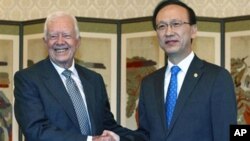Four former world leaders say North Korea has shifted its stance on talking about key issues with South Korea. But the senior statesmen, who spent three days in Pyongyang this week, were not able to meet with the top leaders in either country.
Former U.S. President Jimmy Carter said Thursday that the delegation failed to meet with North Korean leader Kim Jong Il, but a North Korean vice minister read out a message from him. It indicated a change in Pyongyang's position that it would only discuss key issues with Washington.
"They tell us now that they are very willing to discuss nuclear issues or any other military issues directly with South Korea, including at the highest possible level between Kim Jong Il and the president of South Korea," Carter said.
The group, however, was unable to deliver that offer directly to South Korean President Lee Myung-bak, who did not meet with them.
Carter was accompanied by Finland’s former president, Martti Ahtisaari, the former prime minister of Norway, Gro Harlem Brundtland, and former Irish president, Mary Robinson. They are members of a group of former heads of state known as The Elders.
After a flight from Pyongyang to Seoul Thursday the four briefed two South Korean cabinet ministers and spoke to reporters.
They say North Korean officials are adamant that Pyongyang will not end its nuclear weapons programs without "some kind of security guarantee" from Washington.
Talks to end North Korea's nuclear program broke off two years ago.
Beijing's chief negotiator in the talks, Wu Dawei, was in Seoul this week discussing ways to resume them. China has suggested North Korea first meet with South Korea and then with the United States.
North Korea has conducted two nuclear weapons tests and is believed to have enough plutonium for about six nuclear bombs.
The delegation also asked North Korea to release to them an American citizen who has been detained there for five months. But they were told the man has not yet been charged and could not be freed until the judicial process is completed.
North Korea says the Korean-American missionary Jun Young-su has confessed to an unspecified crime against the nation.
The four envoys stressed their visit was primarily intended to explore North Korea's humanitarian crisis.
Carter told reporters that he doubts any outsider can change the North Korean government's attitude toward human rights. He says, however, the rest of world has an obligation to alleviate the suffering of those going hungry in the communist country.
"But one of the most important human rights is to have food to eat," Carter said. "And for the South Koreans and for the Americans and others deliberately to withhold food aid to the North Korean people because of political or military issues not related is really indeed a human rights violation."
Former Irish President Robinson called the lack of food for North Korea's women and children "a matter of utter life and death urgency."
She says South Korea told the delegation it is "seriously considering" a resumption of food aid to the impoverished North.
Relations between the two Koreas have been in a chill for more than a year. Seoul wants apologies for two lethal incidents last year before it will resume high-level talks with Pyongyang. Carter says the North Koreans regret them but will not publicly apologize.
An attack on a South Korean navy ship in the Yellow Sea last March killed 46 South Korean sailors. Pyongyang denies any involvement. An international investigation concluded the ship was hit by a North Korea torpedo.
In late November, four South Koreans died when North Korean artillery bombarded Yeonpyeong island. Pyongyang said its army was responding to threatening maneuvers by the South's forces on the island near the border.
Statesmen's North Korea Visit Yields Direct Talks Offer




